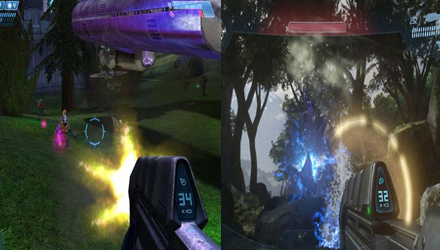Editorials
Resting on their laurels
April 26, 2010, Author: Trent Pyro
Is it just me, or have games been failing in the content department lately? While some recent releases are packed with innovation and originality, many others have shown themselves to be lazily created copies of established classics. In fact, come to think of it, the need to make a quality, well-rounded, legendary and absorbing piece of entertainment has become the exception not the rule and it’s really starting to piss me off. Why is it that, despite terrific and sometimes magical advances in graphics, technology and engines, developers seem content to serve us plain slabs of meat; well dressed but flavourless? I’m here to find out, if only to make some sense of this exasperation that dwells uncomfortably somewhere between by gall bladder and my intestine…
Where it all began
Looking back to the golden age of gaming, epic wasn’t a word that was batted around much. Space Invaders and Pong, with their compulsively eye-catching yet primitive graphics, simply did not have the scope to be grand or complex. Waves of clones followed, with the chief aims and principles being ‘shoot everything’ and ‘try not to die a lot’. Not exactly Hollywood entertainment. However, with the rapid advancement of technology, developers were given the tools to utilise more and more of what made cinema so watchable.
The birth of the RPG (graphical RPG should I say) was, in my view, the first time a solid plot and masses of content was necessary for a game to work. Who was going to bother running around a huge map, talking to random strangers and spending hours tweaking their characters to fight a boss for no reason? Platformers such as Mario gave instant gratification with no need for extended depth and player interaction. RPGs, however, required extensive player effort to succeed and therefore needed to create motivation. Hence the solid story. Without the aforementioned content, the story would lead to nowhere and become stale and boring. As gamers, we need change to stay interested; a game set in one room, however interesting, can only be fun for so long. Many of the games we consider to be ‘classics’ employ a deft mix of engaging plot-line, trend-setting gameplay and solid playability. In my opinion, the golden combination.
The first game I played that could be considered as part of this group was the mind-shattering Final Fantasy VIII. With its unbelievable FMVs and towering, twisting plot-line, it truly achieved the kind of scale usually reserved for a movie. I cared about the characters, despite the pixelated PS1 graphics and silent, text-based speech. I revelled in the story; countries at war, evil witches looking to conquer, assassination attempts, flashbacks, battles to save the very essence of life. This combination of plot, tenaciously addictive combat and visual scale created a brilliant world and an unmatched vista in which players, myself included, couldn’t wait to sink their teeth into again and again. Granted, the Final Fantasy series has a long history of fantastic plots but it never felt to me that Square were writing well because they felt they had to. They did it because they enjoy it and they realised that any game would fall flat on its arse without a good story, or so they thought.
A man went to the shop. The End.
You see, it seems developers of recent years have somehow go it into their heads that a game can survive on playability alone. In some very rare cases, it can. Take Valve’s Left 4 Dead for example. With no plot to speak of, the game tasks you with killing wave after wave of the slavering undead seemingly just for the sake of it. Where it gets its break, though, is the social aspect. Through the medium of online gaming, it allows players to create their own story; gives them a scenario and lets them make their own mistakes and play out their own experiences and events. This leads to plenty of ‘guess what we did on Left 4 Dead last night’ moments, therefore filling the void left by the absence of plot and saving Valve from the scorn of those who like a bit of story with their violence.

Hard at work...
Many other games, though, cannot survive without a decent story, simply because the gameplay is so basic. Gears of War, for example, scrapes by simply because of its intuitive and reasonably original controls. The story is great, sure, but it’s by no means amazing or surprising. Nasty aliens pop up, you have to kill them, a few mild twists, boss battle, end. Not once during my first playthrough did I gasp open-mouthed, startled at an Earth-shaking plot-twist or character revelation. I did love the game and its sequel, and I’m not saying it’s awful or anything, it’s just that when dissected like that, there’s really very little there. Another example, Halo. Now I know what you’re thinking; Halo is amazing, the best series ever and how dare I denounce it one bit. Unfortunately for you, I’m going to, I don’t care and you’re not going to like it.
Come thee angry fans
I very much enjoyed the first Halo game. It was, at the time, the most polished and accomplished FPS I’d ever played, and at times it took my breath away. So far so good. Halo 2 was playable, but by Halo 3 I had gotten bored. Not only had the gameplay improved only in tiny, baby steps as the series wore on, the plot had become so wrapped up in it’s own bombast and bullshit I cared very little for it. The universe created was revealed to be so thin it required bolstering with filler (Halo Wars, ODST, Halo Legends) that was of lesser quality to the main series. Mass Effect did it in one game and a couple of books. Never before have I seen something so simple and so boringly and apathetically written receive so much praise and support.
Okay, so maybe I’m being a little harsh on poor, ageing Halo. Taken within context and time period, the original premise was inspired and enthralling. The gameplay was tight and well above standard, but it seems to me Halo has had an easy ride. Most titles have to employ gameplay changes, sometimes dramatic, plot enhancements and graphical upgrades to avoid the ‘more of the same’ tag the critics love. Some even overhaul the entire control system and change the engine, hoping that the extra effort will somehow gain favour with the public and press. Halo, to me, is the biggest example of product over production. I can see no improvement in the story, graphics or gameplay departments over the series, bar a few control tweaks. Bungie seem to think the ability to fire two weapons at a time and play half the game from the other side of the war is enough to secure popularity, and for some reason it worked. They must be smiling as I type; with a little extra here and there, they’ve managed to squeeze four shooters, one RTS, one animated movie type thing and whole shedload of merchandise out of one, simple, unchanging premise. In my eyes it’s the biggest conspiracy in gaming history.

Spot the difference... I honestly can't.
What does that mean for us, the gamer? That we pay another £40 a time to play essentially the last game with a new story and marginally improved gameplay and graphics? Maybe so. More than that, it means we have come to expect and accept very little from developers that games dripping with graphical swagger but as empty as George W. Bush’s head are hailed as ‘brilliant’ and ‘amazing’ and quality over quantity is standard practice. Creativity is lost in translation or absent from the outset, with developers content to copy one of the established standards (Gears of War, Call of Duty, Oblivion) almost exactly, dress it up differently and call it a ‘new IP’. One unique feature, or gimmick as I prefer to call it, is now enough to entice gamers into parting with the dough. The idea that developers can dupe us with one gameplay twist makes me sick, and I for one make a concerted effort to read between the lines and look past the bullshit to see if there’s really anything worth getting excited about.
So what?
So, where does this leave us? Well one thing I will admit is that my bile is unnaturally acidic on this subject, and therefore I may have contradicted myself and given you the wrong impression. I love games as much as you do; if i didn’t I wouldn’t lay off college work to play them all the time and write about them on this here website. I stand as an expectant gamer, waiting for the next IP that makes me laugh, cry, scream or think. I understand that there are only a few geniuses in any field. There will always be the innovators coming up with new and exciting stuff, and the production factories churning out their versions, content with simply adding small twists, but is it really too bold to demand games that excite me? I think not.
Maybe I’m asking too much. Maybe I expect too much, and my view of gaming is idealistic and flawed. I find myself getting less and less excited when friends say “‘it’s a third-person shooter but you can shoot beams that change enemies into friends’ or something, grimacing and shaking my head, discontent with another gimmick. I want my steak medium rare, with all the trimmings, every time. Is that really too much to ask?
Tagged argue, boring, Bungie, debate, developers, gear of war, gimmick, halo, laurels, lazy, samey


